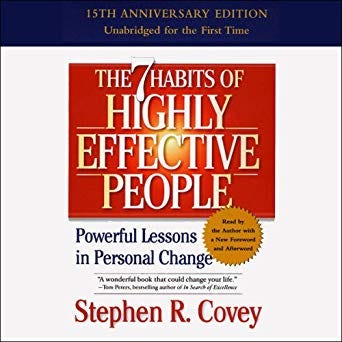Professional Reviews of the 7 Habits of Highly Effective People
Volume review : The vii habits Highly Effective People - Powerful Lessons in Personal Change

Summary and book review of "The vii habits Highly Constructive People": In his book, the author lays out the vii habits of successful people, the seven fundamental principles that enable the most successful and entrepreneurial people to achieve their goals. Used on a daily footing, they will help those who practise them to live a happy, well-balanced and successful life.
Past Stephen R. Covey, 1989, 342 pages.
Note: This column was written by Ali Nejmi.
Book review and summary of "The 7 habits of Highly Effective People"
The book is a reference to the skills of personal development, constructive communication, and successful interaction.
Covey doesn't merits he tin produce an instant miracle, rather a gradual process of transition that, with practice over time, will give us the tools to brand radical and positive changes.
It shows u.s.a. how to explore ourselves in-depth, our philosophies, the parameters that we set out, and how we deal with the bug that happen.
Information technology likewise shows the states our well-nigh 18-carat, long term, and deep-rooted values.
The book not just sets out a step-by-footstep arroyo to a successful business, simply also defines the ethos of a mode of life-based on the principles of ethics, integrity, wisdom, and common sense.
The laws of success, outlined in the book, are universal and applicable to all areas of life. Yet, they must be proficient on a daily ground. Success is a habit, as is failure.
With all the responsibilities and time constraints that are imposed on us, in such a competitive world, it is very helpful to take such a well-written guide.
We are also working on a gratuitous PDF version of the book The 7 Habits of Highly Constructive People.
Introduction
Habits i, 2, and three deal with the notions of being proactive, self-control, and being independent. They set out the foundations for the skills required in order to succeed.
Habits 4, five, and 6 nautical chart the path to interdependence, and provide the route towards being successful.
Habit seven refers to the previous points and the continual improvement required in relation to the various challenges that life brings.
You volition find a free PDF of the volume The 7 Habits of Highly Effective People at the foot of the article.
Part 1 : Perspectives and principles
Most people spend their lives seeking happiness through fabric gains and like to show off their achievements. However, this ofttimes results in a lack of self-fulfillment, without meaning or reason. These inner problems don't always have a elementary answer.
The cause of these issues is rooted in how we recall and what information technology is that motivates us. We interpret the world through what we have learned from the people we know and the surroundings in which nosotros live.
The perspectives of the 7 philosophies
Dependency
1: Be proactive
ii: Keep the final goal in mind
Personal success
3: Prioritise the priorities
Independence
4: Recall win-win
Public success
v: Try to understand first and then exist understood
half-dozen: Synergy
Interdependence
vii: Sharpen your skills
Any effort to alter that is restricted by our attitudes and behaviors is ofttimes counterproductive. To exist more constructive, the focus must be on our perceptions and philosophies. Real success relies upon the introduction of these cadre principles in to our bones character.

For decades, the road put frontward to success was presented as being able to persuade people to follow the message they were being told.
These techniques were mainly concerned with brand epitome, influence, manipulation, and flattery (advice, status, and image).
According to Stephen Covey, these techniques take a peripheral part in the achievement of a happy and successful life. To be more than effective in the long-term, these techniques need to be combined with our most basic values, such as sincerity, empathy, nobility, and trust. "Only fundamental goodness teaches the fine art of life!" It is the person'south character that communicates more than eloquently.
The result of these techniques is limited, as they often contradict natural laws of growth and development. "You reap what yous sow." There is no shortcut. This principle is also true, in the same degree, with regard to other human activities. The latter are as well linked to "law of harvesting".
The ability of philosophy
The routines outlined by Covey are both bones and straightforward. They embody the internalization of the principles on which long-term success and happiness are based.
The main difference lies in our philosophies: how we perceive and interpret things? "The map is not the territory."
Our philosophies are the maps that guide us in our daily lives. They are blueprints that have been ingrained in u.s.a. by others (family, lodge…).
These blueprints shape both our perception of reality and our expectations of this alleged reality. For u.s., reality is such that we perceive information technology.
Therefore, this perception is the source of our thoughts, emotions, and deportment. As logical equally our perception may be, it is invariably fraught with subjectivity. Nosotros see what we want to run across.
In this context, we can cite the phenomenon of deprival, which is a psychological defence mechanism, where the individual ignores the being of a hurting they feel.
The more nosotros are aware of our basic philosophies, and the unlike perceptions that are ingrained in us, the more nosotros can assume our responsibility and take our destiny into our own hands.
Equally a result, we can examine these philosophies, test them, or fifty-fifty completely transform them. Our perspectives then become broader, images sharper and perceptions more than balanced.
The paradigm shift propels change in life. It can exist seen that significant breakthroughs in all fields (science, religion, art…) were, above all, breaks with traditions, quondam ways of thought and philosophies.
The principle of growth and modify
What we see on the outside is a adept indication of who we are on the inside.
Principles are set in stone. They are natural laws that cannot be broken. They are not esoteric, mysterious or religious. The keys to success transcend beliefs, schools of thought and cultures. They are unquestionable considering they are clear.
Moreover, principles are non practices. The latter are specific actions that can work in one case and non in another.
Principles are not values either. Gang members may share values of friendship, compassion, and respect, but in contravention to well-nigh of order's perception of morality and ideals.
Literature is full of theories that advocate shortcuts, to become rich quickly, or to succeed without the need to do whatsoever work. These theories but make the authors rich and ruin the lives of people who believe in their false philosophies.
At that place are sequential stages of growth and development in the all-natural procedure. Each stage is important, and it takes fourth dimension. We all recognize this fact in its physical form, but few of us can incorporate it into inner emotional and personal relationships. We desire things to happen immediately.
The notion of achieving the result, speedily, with the least endeavor, contravenes the natural law of growth, and often leads to thwarting and distress.
The problem is how we approach the problem
The more people await for quick solutions, and concentrate on problems and hurting, the more this mind-set adds to the long term trouble.
Nigh people who nourish seminars on time management, strategic planning or self-improvement, practice then in search of miraculous results. They mostly fail in their attempt to be happy, productive or fulfilled in life, or to achieve their long-term goals.
The starting signal of true selves is oft forgotten, our perceived problems are found deep inside ourselves, in our design of idea and how nosotros approach them.

Albert Einstein stated, "The important problems we create cannot be solved at the aforementioned intellectual level as the one nosotros have at the time of their cosmos".
Problems are signs of failure in the way nosotros recollect; every bit a result, the solution requires a change to this failed procedure. "Don't criticize the neighbour'south laundry if your windows are dirty!".
Events are neutral and accept no intrinsic value other than the ane nosotros assign to them.
The best arroyo is to restore the soul from within and reconnect it to Nature.
The ability of repetition
Nosotros are the product of what nosotros repeat. Excellence is not an attitude, but a habit. "Plant a thought, harvest an action! Sow an activity, reap a habit! Sow a habit, reap a character! Institute a graphic symbol, harvest a destiny!".
Habits are a powerful force, which is often underestimated. Their power of inertia can be crippling. It requires a huge and sustained effort to overcome a habit.
In the final analysis, as Marilyn Ferguson observed, "Each of us is hiding a door of change that can only be opened from the inside. No argument or emotional appeal tin can open this door from the outside".
Continued growth
To achieve maturity, the individual must transition from a land of dependency to one of greater independence (personal) and interdependence (relationships).
Someone who is independent is characterized past his or her habits, and by other people's opinions and behaviors. They base of operations their emotional lives on the weaknesses of the people effectually them. Being a truly independent character makes us responsible and leads us to be more proactive rather than reactive.
On a deeper level, interdependence reflects a greater maturity, equally people share vast resources and a myriad of opportunities that a single person is unable to reach.
However, productive interdependence requires independent people. Dependency never leads, directly, to interdependence.
Definition of efficiency
If we adopt a lifestyle that purely focuses on results, while ignoring our basic needs, we volition, sooner or subsequently, frazzle our means to produce annihilation.
Efficiency means keeping a constant remainder between product and ways of production.
In our pursuit of quick-fix gains, we are weakening our strong points (our gold goose) and undermining the long-term benefits.
Efficiency keeps the brusque term (production) and the long term (resources) in sync.
Part two: Individual victory
Addiction 1: Exist proactive
Principle: I am complimentary to choose and answerable for my choices
Definition of proactivity
Self-awareness allows united states to distinguish us from ourselves, and permits us to examine the basis of our philosophies and determine how effective they are.
Is how we see ourselves the way social club sees us? If this is truthful, our beingness depends on the external environment. Our maps are drawn past others. Our character is defined by how we react to the situations that arise at the time.
"Between stimulus and response, man ever has the freedom to cull the nature of his response".
Stephen Covey cites the feel of Viktor Frankl, a Jewish deportee in Nazi concentration camps, who decided to exercise psychological freedom in response to the inhumane physical suffering inflicted by his torturers.
Frankl discovers that the near of import trait of successful people is being proactive. Rather than but taking the initiative, it is virtually existence completely convinced that you are responsible for your life. Our actions are the result of our conscious decisions, our choices, non our conditions. An unconscious decision is a thoughtless emotional reaction.
Reactive people build their ain emotional lives on the weaknesses and defects of others, whom they then command and direct.
"No one has the power to hurt you lot without your consent," said Eleanor Roosevelt.
In Gandhi'south words: "they are non able to deprive u.s. of our dignity without our agreement".
In the existent globe, events or people could inflict concrete or moral suffering on us, only our core identity does non have to be affected.
Challenging experiences leads united states of america to re-evaluate our philosophies. They can signal a defect in how we call up (alcoholism, divorce…), or they can trigger other levels of consciousness in united states that we could never have reached.
Accept the initiative
People are conditioned to exist reactive: they wait for time to better things, for someone to accept care of them, or for others to brand their decisions for them.
Successful people, on the other manus, are proactive: they conceptualize, they seek solutions rather than focus on the problems.
Listen to your own linguistic communication
The way we speak is a skilful indication of how proactive nosotros are. Reactive people speak in a way that absolves them of any responsibility. It's everyone else'due south fault simply theirs. This style of oral communication concentrates on the problem and the by.
Proactive language explores alternatives, different approaches and promotes interaction and compromise. Emotions are secondary to values. This style of speech communication concentrates on the solution and the time to come.
Exist open-minded, not a judge, an inspiration, not a critic. Exist part of the solution, non part of the problem.
Circle of concerns. Circle of influence
People spend their time and energy on things that aren't that important or that urgent.
As a result, our actions can be divided into two circles: a circle of business organization and a circle of influence.
The circle of concern is made upward of all the things over which we take little or no control :
- The climate,
- The atmospheric condition,
- And the beliefs of others…
While the circle of influence is about things we tin can command:
- Our attitude,
- Our deportment,
- And our piece of work…
The circle in which we spend most of our time and how we spend our precious energy affects how proactive nosotros are.
To be more than effective, our focus must be on our circle of influence, our field of activeness, and production. The more than time spent in your circle of concerns, the stronger the concur over other people in your life, the more you lot accept negative thoughts and less self-conviction.
Sometimes it is not possible to change things. In this case, you must be able to accept things with serenity. "My God, give me the courage to modify the things I tin can change, the placidity to accept the things I can't and the wisdom to know the divergence" (Alcoholics Bearding Tranquillity Prayer).
We have a duty to take control of our lives, and to make the right decisions. The consequences of our actions and mistakes are role of the circle of concerns. If you lot regret things or attempt to justify those mistakes information technology doesn't help and won't help solve the bug.
To be able to correct and accept mistakes is the proactive approach. Learn from it and move on.
Habit ii: Keep the final goal in mind

Principle: mental creation comes earlier concrete creation
- Habit 1: You are responsible for your life.
- Habit two: You can create your life.
To alive life without goals is like setting off on a journey with no destination in mind.
The example given below is a clear indication of what goals and values are the nigh important to us. Visualize yourself at your own funeral, and reflect upon stories and memories you would similar to hear from those whom you lot loved and those who loved you lot, from all walks of your life.
The goal is the aim by which we approximate our actions. Each day you need to exercise something positive towards achieving that goal.
Towards the stop of life people often take the realization that what they were trying to reach is void of meaning or intrinsic value. Rather than these achievements you should care about the things that matter most: wellness, family, relationships…
These goals atomic number 82 us in the correct direction, terminate the states from straying into situations we tin can't control and beingness overrun past twenty-four hour period-to-day life.
A worthwhile goal must be based on our truthful values, and the accustomed principles of fairness and care for others.
If you program your future it creates a sense of responsibleness, self-confidence and stability. It as well helps you to react to and solve the problems that life presents
Without goals, we rely on our weaknesses, plumbing fixtures in with society, being accustomed and how people look at u.s.a..
Personal mission
Habit ii states that we are non obliged to live life by the rules we are given.
We are imaginative and creative plenty to set our ain goals, equally each private is different and has their own thoughts and values.
Frankl's studies accept concluded that mental and emotional illnesses reflect a lack of self-conventionalities and sense of purpose.
"People cannot experience change if they do not have an unwavering cadre within them". Life's mission forms this solid nucleus.
The core values to a stable life are the feeling of security, orientation, appreciation, and power. Life's main concerns should encompass family, business concern, money, leisure, and friends.
Each one of these, individually, volition not consequence in lasting happiness. On reflection, most of the things that nosotros achieve and savor are pointless and have no pregnant.
To live a life without regrets we must examine who we are and what our cadre values are. It is this that controls us. Our well-being is dependent on it.
If our core values don't contribute to united states existence more proactive, there is an urgent demand for fundamental changes.
Write your personal mission
The journeying to write your personal mission argument is long. It requires constant changes, depending on how well balanced you lot are, feedback, and sometimes re-evaluation.
For example, elements of the circle of concern could subconsciously creep into our routines and breakdown the proactive approach to life.
To write the statement requires a wide perspective, an open listen, with all of your senses engaged and to stay truthful to your emotions.
Assertiveness and visualization are recognized as powerful tools in gild to be successful. Smashing champions imagine, feel, alive, and mentally feel their achievement before transitioning to conveying it out. These two techniques are a kind of neurolinguistic programming.
Fix out roles and objectives
Of import roles and long-term objectives ensure a balanced and harmonious life. These roles get in possible to build and organize the framework of the personal mission statement. This simplifies the integration of specific objectives and very curt-term activities.
For example, the mission statement of a group or arrangement needs to be formulated in consultation with and involvement of all the relevant members. No involvement, no delivery! A mission that is cogitating of the goals shared by all is the foundation for greater unity and active appointment. The members of the group will not always be told what to practice, as their heads and hearts are fully immersed in the shared goals.
Covey quotes IBM'southward mission statement, which places 3 principles in a higher place all: individual nobility, excellence, and service.
Driving forces and constraints
The current level of performance is the result of the balance between driving forces and discouraging constraints.
The driving forces are related to the circumvolve of influence. While the negative forces are related to the circle of concerns.
To succeed in life, we have to strengthen the driving forces that motion the states forward in the direction of our mission, whilst simultaneously reducing the constraining forces that hold us back.
It is a long process that requires patience and perseverance, along with a loftier level of proactivity and moral integrity.
Addiction 3: get your priorities right
Principle: The most important things should never be at the mercy of those who are unimportant.
The third habit deals mostly with efficiency and discipline in the implementation of the plans of action.
In this process, conclusion and belief are the characteristics that drive emotions, impulses, and temperament to achieve the goals set out in the personal mission.
"Successful people are used to doing things that those who have failed don't like to practise! Sometimes they do them without passion, but their reluctance is overcome by their desire to succeed!"
You could ask yourself the following question: what is information technology that, practiced regularly, could radically transform this projection or specific areas of my life?
After the introduction of various forms of fourth dimension direction, Covey concludes that the term is a misnomer. The challenge is no longer time management, but self-management. Relationships and results, non time and methods, must be the first priority.
Time matrix

Importance and urgency are the two main factors that govern whatever activity. From this testify, we could depict a table consisting of four quadrants that categorize our piece of work according to the level of importance and urgency.
Timetable
Important :
Urgent — I. Functions; Crises, Urgent problems, Project deadlines
Non-urgent — II. Functions; Prevention, Maintaining relationships, Exploring new options, Planning
Non of import:
Urgent — III. Functions; Disruptions, Mail and feedback, piece of work to be completed, things that cause distraction
Non-urgent — IV. Functions; Things that cause lark, Mail, Unimportant phone calls, Trivia, Wasting time
Vital tasks are obvious but result in stress and pressure
Of import tasks, on the other hand, are not as urgent, but are vital to the accomplishment of our long-term goals. They are results-oriented, which entails initiative and proactivity.
The instinct of "least resistance" diverts us from important tasks to easier ones.
Quadrant 1 includes activities identified equally crises or problems. It takes up xc% of the time of inefficient people. You tin find all the stressful vocabulary such as crisis management, meeting deadlines, blood-red indicators…
Sure people spend most of their time in Quadrant 3, dealing with emergencies that are not important. The fact is that they are conveying out tasks that others deem to be important and urgent (time and energy thieves).
Quadrant 4 is the place for leisure and pleasure. The place of idle people!
Quadrant 2 is the chief focus of successful personal management, positive energy, and growth. "This is the identify for people who nurture opportunities, minimize problems and prevent them from happening! ". Successful people devote most of their time and free energy there and develop their passions. They avoid beingness stuck in the other quadrants for long periods of time.
In management jargon, this arroyo could be compared to the "Pareto principle" which observes that 80% of the results come from 20% of the tasks.
Nevertheless, that tin't be right, considering nigh people autumn into the addiction of routine and find themselves, unknowingly, outside quadrant ii.
Quadrant two, dissimilar the others, satisfies the post-obit principles:
- Coherence, harmony, unity between vision, roles, objectives, and priorities.
- Residual in all aspects of life (wellness, family, profession…).
- Programming priorities and not ownership of the programs.
Know when to say No
To stay focused on the important activities in Quadrant 2, sometimes you lot accept to be able to say "No" to other tasks that may be urgent. "The enemy of the best is often the expert! ".
Quadrant 2 Management
Covey recommends setting yourself weekly tasks, though it can be flexible and open to change.
Iv cardinal components are necessary for proficient management:
- The identification of roles that require a regular investment of fourth dimension and energy: family unit, profession, leisure time…
- Decide what y'all want to achieve each week and the goals, in relation to the points above.
- Schedule the week'southward activities based on the first 2 steps, just don't lose sight of the target you wish to reach (the vision).
- Daily adaptation: manage unforeseen events, reschedule appointments, make the most of unforeseen situations….
Efficiency or effectiveness?
The nature of humans is completely at odds with that of machines. In all manufacturing processes, the best results are achieved when machines are running at their full capacity. Notwithstanding, when dealing with human resources, the objective is based on efficiency, not performance. The power to be spontaneous, flexible, and adaptable with people will help nurture their respect and loyalty.
Delegation
At that place are two types of delegation: delegation to time and delegation to others. The offset relates to performance, the second to efficiency.
If you defer a task information technology means you sort out the near of import affair first and reschedule the others for after.
Delegating tasks to others, who may be more than skilled at them, increases product. It besides shows skilful management, helps to bond the team and grow both individuals and the company.
Part 3: Public triumph
The image of interdependence
Public triumph is preceded by individual triumph, which is the natural result of the starting time iii habits. Independence, self-control, and self-subject are the foundations of successful relationships with others.
People exercise not come across us by what we say or do, just who we are.
Emotional feelings
Each of us has an emotional depository financial institution account that gauges the level of trust that we have built-in relation to others. This business relationship is either a debtor or a creditor, depending on what is going in and out.
The account is credited when one is honest, kind, understanding, aboveboard, respectful… Nether these circumstances, communication is polish, spontaneous, and productive.
However, the account loses out when one is dishonest, duplicitous, unfaithful, manipulative, lying… in this case, communication is difficult, hypocrisy prevails and trust is eroded.
Big deposits
A willingness to have the ideas, scenarios, and worries of others into consideration is the almost effective way to build relationships.
"Treat them the aforementioned by treating them differently!", said a good father.
In relationships, minor gestures build solid trust. People are inherently very tender and very sensitive, irrespective of age, social rank, and gender.
Honor commitments and promises as it builds feelings of trust and respect.
Clarify expectations and responsibilities to eliminate the conflicts and misunderstandings that arise when results are not accomplished. The assumption that expectations are clear and understood by all is the basis for things to get wrong.
Integrity is a key quality of successful interdependence. Unlike honesty, where words reflect reality, integrity means that reality is in keeping with our commitments, promises, and principles. Integrity commands respect, which is far more than of import than beloved.
Inquire for forgiveness and apologize for mistakes and shortcomings, as it replenishes the emotional banking company and sorts out problems.
People who are not cocky-confident will rarely apologize, for fear of existence seen as weak. They are held back by how they remember others meet them.
Human relationship bug are opportunities
Proactive people look at a breakdown of trust, conflicts of interest, and misunderstandings as opportunities to develop stronger relationships based on integrity, mutual interest, and meaningful give-and-take.
The patterns of interdependence
Habit 4: Call up Win-Win

Principle : There is no lack of resource, and at that place is enough for everyone.
In business, a win-win outlook motivates successful people. They look for common interests and mutual benefit. They do non come across life as an expanse of competition, but rather as a chance for cooperation.
The breadth of opportunity controls their thought process. The success of 1 will not be at the expense of the other. There's plenty for everyone. There is always a tertiary and better alternative.
In some cases, it is preferable not to reach an understanding if a solution cannot be found that guarantees the win-win principle.
The other solutions, in which one of the parties suffers a loss, sow the seeds of resentment, suspicion, and potential misunderstandings.
Because people have been raised to believe that you tin only win or lose, or that great opportunities are rare, information technology makes their lives harder than they should exist.
The win-win spirit requires very high personal abilities based on:
- Personal integrity.
- Maturity: the balance betwixt personal courage (personal) and consideration of others.
- Plenty for anybody: there is no shortage of resources and in that location is enough for anybody. Information technology creates opportunities for more sharing, collaboration, creativity, and participation.
Habit 5: First endeavor to understand and then to be understood.
The principle of empathic advice
"The heart has its reasons that reason does not know".
"To touch a human being's soul is to walk on sacred ground!"
Within relationships, people tend to judge and make quick conclusions before properly analyzing the situation.
Communication is the nigh important skill in life. Many years of experience are required to be able to speak, read, write and communicate well.
Yet, few people genuinely learn to listen, put themselves in the shoes of their audition, and see things from another perspective.
We commonly listen in society to respond: evaluate, justify, advise, refute or intimidate. We pass everything through the lens through which we come across life. And we projection what we are inside, our views of what others say and do. As a outcome, what we say is zilch more than a bunch of long collective monologues.
Know how to listen with the aim to understand. That is what makes the divergence.
Empathic communication does not mean to concord with everything. Be prepared to listen and contemplate the situation, environs, and possible reactions of others on an emotional and intellectual level.
Communication experts estimate that 10% of the message is conveyed by words; the rest is by sound and trunk language. Empathic listening entails not just your ears, but also your eyes and centre.
This approach unlocks the doors to peoples' souls and hearts and reveals a clear paradigm of thoughts and emotions. It likewise provides us with detailed information to properly evaluate the situation.
By their nature, humans need to survive psychologically through understanding, appreciation, and affidavit. Empathic communication provides the state of mind that paves the way for solutions and agreements. It allows the problem to be put on the table and examined on the same side, rather than on ii opposite sides. The result is a solution that is obvious and acceptable to all.
This concept can be implemented in the field of sales. While the amateur salesman sells products, the professional sells a service and provides a solution for any needs or problems.
From a family point of view, homes accept turned into hotels, parents, and children being disconnected due to a lack of empathetic advice. "Generation conflict," they say! But the main reason stems from how parents deal with the situation, which is often judgmental, aggressive, linked to their childhood and conditional beloved.
To sum up, habit 5 is a combination of the art and the skill of knowing how to accept differences, with the objective of collectively building a cute world, united past its diversity. Diverseness of perceptions, interests, traits, and flaws.
Habit vi: Live in synergy
Principle of effective collaboration.
All of the rules described above create a synergy. Like a molecule created by the union of several completely different atoms, a new life emerges through the collaboration of proactive people, whose intent is to accomplish an empowered lifestyle.
Synergy defies mathematical laws. It is defined as follows: The whole is greater than the sum of its parts! 1 plus ane is equal to three or more than! Synergy governs nature in all its most miraculous forms.
Synergy is the embodiment of the spirit of abundance.
People who believe good things rarely happen, are competitive and just accept a win or lose arroyo, are a full anathema to the liberated value of synergy.
In a quest for innovation, chance and discovery, synergy opens upward afar horizons, uncharted territories, and incredible possibilities.
The very essence of synergy is based on the evaluation of differences past the consolidation strengths and the ability to solve any weakness.
Synergetic communication
"If a person disagrees with you, there must be a reason behind it that you don't yet understand. So take time to encounter things from his point of view!"
Synergetic communication opens up new perspectives and other alternatives. It liberates the heed and emotions from the barbarous circle of a defensive, protective, and self-centered mentality.
Negative synergy
People offset new relationships, shaped by the retentivity of their terminal happy or unhappy experience. If it was hurtful, they proceeded with a negative listen and suspicion.
With such a negative approach and feelings of insecurity, synergy volition never have a chance to flourish.
People who are insecure believe that reality must exist in line with their philosophies. To experience safe, they need to be surrounded by people similar themselves. They practice not appreciate that growth is synonymous with diversity. Everyone beingness the same does non bring people together and neither does it create a culture of creativity.
Evaluate the differences
"If two people have the aforementioned ideas, then ane of them is not necessary."
If you interact with someone who shares your ideas and thoughts nothing will exist gained. You might as well stand in front of a mirror and tell yourself yous're the most beautiful person in the world.
Two individuals may disagree, and exist right at the same fourth dimension. This is not logic, but psychology!
Synergy is the appreciation of difference. It brings people together with unlike intellectual backgrounds, who possess different and complementary skills to attain the results.
The truly empowered person has the modesty to recognize the limits of their own perceptions, and appreciate the rich talents of others.
Addiction 7: Re-address the balance
Principle: To maintain and increase our functioning, we must refresh our physical, emotional, mental, and intellectual resource.
"Sometimes, when I realise the enormous affect of small things, I tell myself that in that location are no modest things!"
Habit vii deals with personal development and constant comeback. A good craftsman never forgets to sharpen their tools, maintain their machines and improve their skills.
On a personal level, development must be balanced and embrace all iv dimensions of personality: physical, spiritual, mental, and social/emotional. These dimensions class our moral heritage, our values, our assets, and our productivity.
The quality of our lives relates to the evolution of each of these four aspects of human being life.
The concrete aspect
Good for you nutrition, sports, and relaxation. Regular activities that aid reach a Zen state of listen, freedom of thought, and invigorate united states of america.
The spiritual aspect
David O. Macky said "The smashing battles of life take place daily in the silent chambers of the soul".
The spiritual dimension is the heart of our beingness. It is from this eye that the signs of our true nature and deepest values polish forth.
Meditation, reading great literary works, music, and beingness in bear on with nature, amidst others, are techniques to regenerate our spirits. These escapes foster a sense of inner peace, repose, and harmony.

The mental attribute
"The person who does not read is no ameliorate than the person who does non know how to read.''
As presently equally they leave school, most people let their mental evolution wane. They restrict themselves to their field of expertise and fail to discover other, more fulfilling opportunities.
The "I want it now" culture created past the mass media, social networks, and imitation news articles stifles any questioning minds. It undermines all thoughtful reflection and creates a dumbed-down guild.
There is no better way to learn and develop your intellectual abilities than through great literature. Great novels enable us to connect with some of the best minds in history. There'due south no need to spend a fortune on courses.
Writing also enables us to develop the precision, lucidity, and importance of ideas.
The social/emotional aspect
The social and emotional elements are closely linked. Our emotions are our responses to how we react within our social environment. Just these emotions also define the quality of our relationships with others.
Habits i, 2, and 3, developed above, are designed to strengthen our emotional independence and personal prophylactic.
However, a well-developed intellectual level cannot ensure a socially successful life, without stiff emotional security, where everyday habits are in harmony with real values.
To limit ane's energy and time in search of self-interest, money and short-lived pleasures never leads to lasting success or true happiness. The latter is never plant through a life of selfishness and greed.
Several studies have shown the link between the truthful meaning of happiness and the completion of projects that bring added value to society. This is what really brings joy to our hearts. Our life also extends to our community, to whom we have a duty of service and contribution.
Eldon said , "Service is the hire nosotros pay for our enjoyment of life on earth!".
Book critique of "The 7 Habits of Highly Efficient People":
Covey's book deserves to be an integral part of the school curriculum. Nosotros learn to fly similar birds, to swim like fish, but we neglect to larn to live on state.
The author reconciles us with our inner nature. Certainly, the 7 habits are mutual sense. What is obvious when we think clearly is lost in the blur of the daily routine. The book reminds united states of america and rekindles what lies within u.s..
Simply by reading the book, from a practical perspective, gives united states an insight on how to grow in maturity, awareness, and independence.
The construction of, and the mode in which the ideas are presented, allow us to easily follow and understand the seven habits. Each section begins with a statement of the key philosophy backside the rule. And then, the theoretical caption of the philosophy is accompanied past a series of real-life stories. Finally, each part ends with practical suggestions on how to implement the relevant concepts.
Personally, how I see things and people has been transformed, at to the lowest degree theoretically. I have started to be more than empathetic towards people who take different points of view and to respect them.
Thanks to the book, I accept begun to understand, in more than depth, my emotional reactions, the roots of my anxieties and insecurities.
Admittedly, the path to change is long and sometimes difficult, but when you are clear virtually the end results, the volition and desire to succeed are at their peak.
Strong Points of The 7 habits of Highly Constructive People:
- The fashion the book is written is well put together. Simple and pleasant to read.
- Ideas are articulate; the concepts are both profound and straightforward.
- The implementation of the practices is helped past exercises at the end of each chapter.
- The book shows its merits compared to those that offer quick and unlikely answers. He advocates long-term work.
Weak Points of The 7 habits of Highly Effective People:
- The order of the contents could be amend.
- The same ideas are repeated a number of times.
- Bulky book.
- Needs to exist read more than once.
My rating :

Have you lot read "The 7 habits Highly Effective People"? How exercise you rate it?
Read more than reviews on Amazon about "The vii habits Highly Effective People"
Buy on Amazon "The seven habits Highly Effective People"
Source: https://olivierrolanden.medium.com/book-review-the-7-habits-highly-effective-people-powerful-lessons-in-personal-change-d137b4de90ed
0 Response to "Professional Reviews of the 7 Habits of Highly Effective People"
Post a Comment